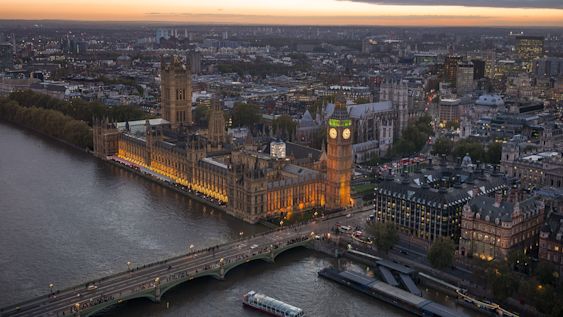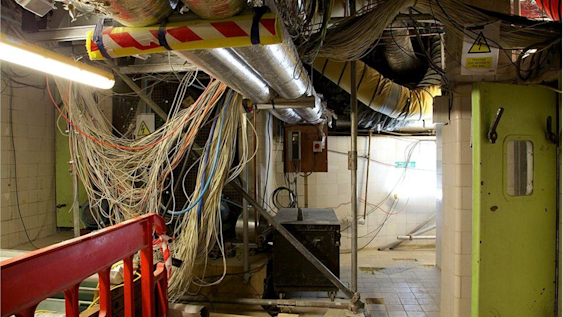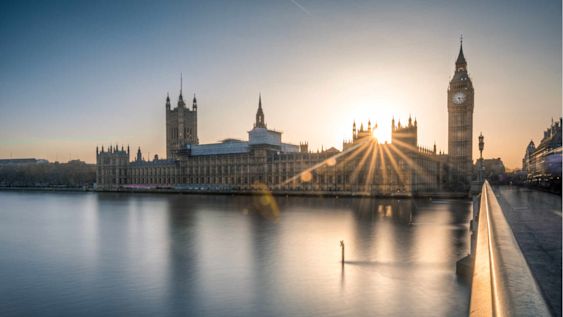
Is Parliament Ready for Brexit?
After probably the most momentous month in British politics since 1945, there’s one Leave decision that virtually all MPs and peers seem agreed on, and are even looking forward to: Parliament begins its long summer recess on Thursday, 21 July.
That six-week break will offer time to draw breath and consider how Parliament should respond to those recent tumultuous events. As the Deputy Commons Speaker, Eleanor Laing, put it at a meeting of the Hansard Society on Monday: “If Jeffrey Archer had presented to his publisher a draft outline of a novel charting the last four weeks at Westminster, it would have been rejected as much too far-fetched!”
She neatly set the scene for a special seminar held after the Society’s AGM, entitled: It’s Brexit… So what now for Parliament?
The task of the seminar - held in Parliament’s Portcullis House with a packed audience on the first sweltering evening of an ephemeral summer - was to ponder with some of Westminster’s finest constitutional minds just how MPs and peers can play a significant part in shaping the Brexit negotiations and the eventual deal these are meant to deliver.
Some straws in the wind of change blowing through Westminster came from the passionate comments and thoughtful insights expressed at the meeting, which concluded that Parliament should have a major role - not only in scrutinising but also in shaping how the Brexit negotiations and the eventual deal are constructed:
- “How should we understand what’s happened? Is this divorce? Or is it a trial separation? Is it just a big argument? Are we seeing buyers’ remorse?”
- “How can Parliament play any significant part in assessing how to disentangle the legal complexities of four decades of euro-law when it has fewer than 20 lawyers of its own compared to the government’s 2,000?”
- “We do have a problem because Parliament is not an easy beast to manage: it doesn’t speak with one voice but we shouldn’t be waiting for the government to take the initiative.”
- “Once the terms of exit are known, it is up to Parliament if it wants to legislate for another referendum. You could be asking if you accept the terms negotiated.”
- “We have to leave before the 2019 euro-elections for new MEPs. If we are putting up candidates for these elections, people will take to the streets!”
Major problems to be resolved
Not everyone saw the problems thrown up by the referendum’s narrow Leave vote in such apocalyptic terms as that last prediction from one audience member, but the panellists agreed there were major problems to be resolved if Parliament was to play a significant part in the process of disentangling the UK from the European Union over the next couple of years.
The Conservative peer and constitutional historian Professor Philip Norton said Parliament’s consent wasn’t required for the government to trigger Article 50 of the Treaty on European Union, firing the starting gun for the two-year process of leaving the EU. That was a matter of international law, he said. But he thought it would be “politically wise” for ministers to ensure they had parliamentary support for the process. Lord Norton said Parliament should have a more pro-active role than just reacting to what the government would be doing on the Brexit negotiations.
He backed calls for some kind of joint parliamentary committee of both Houses and argued that MPs and peers must be involved in the final stage of what he called the “heavy lifting” to remove the vast swathes of EU legislation on the Westminster statute book… which could occupy a great deal of parliamentary time.
The former shadow cabinet member, Labour’s Seema Malhotra MP, explained why she and her Labour colleague, Stephen Kinnock, were calling for a special new parliamentary committee to be set up. She said it was still totally unclear what the new Prime Minister, Theresa May, actually meant by saying “Brexit means Brexit”. She was disappointed by the referendum result as an active supporter of the Remain campaign, but she stressed the need now was for pragmatism and an acceptance of the result.
Scrutiny role for Parliament “not enough”
She welcomed the setting up of a Brexit government department under the newly-appointed David Davis MP, adding that Parliament had to be very demanding now, with proper accountable structures set up. Simply having a scrutiny role wouldn’t be enough, she said, given the scale and complexity of all the issues involved. So she envisages a special joint parliamentary committee being set up by September when MPs return to Westminster, one that involves both Houses…and she suggested that part of its remit should include a clear role for opposition parties and to ensure that Remain voices were heard too, along with wide consultations outside Parliament as well.
The Commons’ Clerk of the Journals, Paul Evans, a highly-experienced adviser on the constitution, questioned Lord Norton’s suggestion that Parliament had no say in triggering Article 50. If it was being suggested this could be done using the government’s powers under the Royal Prerogative, he begged to differ. He told the meeting: “The whole history of Parliament is about circumscribing the Prerogative. That is what we do. That is our job. We are certainly free to do so if Parliament wants to act”.
Liaison Committee should take the lead
Mr Evans bemoaned the fact that Parliament was, in his words, “not an easy beast to manage”, and one that didn’t speak with one voice. He said a ‘typical’ continental parliament - faced with this kind of constitutional crisis - would be “getting its act together” and beginning to negotiate resources and how to proceed. In fact, he had learnt from sources that both the French National Assembly and the German Bundestag had both begun to set up committees to look at Britain’s likely EU exit from their own point of view, while Westminster dithered.
He thought the obvious group to lead this high-powered committee required was the Liaison Committee, made up of all the chairs of Commons select committees. But it hasn’t yet spoken out, or expressed any view on how it would coordinate a response. He pointed that the new Brexit department under David Davis would have a new select committee to scrutinise it but said he would be uncomfortable if that was Parliament’s only response. Other committees would want to be involved too. All the speakers seemed to agree that something along the lines of the wide-ranging Banking Commission, which was set up to analyse the causes of the 2009 banking Crash was certainly one possible model for how to proceed.
Mr Evans also pointed to what he called the deficits in the UK Parliament’s approach to scrutinising the EU over 40 years. He thought Britain’s Euro-MPs had never been treated with any great respect.” We don’t even give them parliamentary passes,” he pointed out. Similarly, there were few institutional links with the devolved administrations of Scotland, Wales and Northern Ireland.
Commons and Lords “not very good” at sharing resources
He underlined concerns that Parliament couldn’t move as quickly as the government on Brexit, saying that Theresa May became Prime Minister on Wednesday, and by Thursday we had a Brexit government department and lead minister, and by Friday it had a Permanent Secretary and civil servants. Parliament simply couldn’t match that. There was as yet no “Brexit Unit” in the House of Commons. “We need to share resources between the two Houses, something we are not very good at. It is all quite ‘make do and mend’. We are very proud of our ability to improvise but this may well be a test that provokes Parliament to act, so we can achieve a satisfactory result,” he added.
Answering questions from the packed audience, Lord Norton dismissed continuing concerns about the legitimacy of the Leave vote due to the wafer-thin majority of less than 4%. No threshold or super-majority had been imposed on the referendum bill when it went through Parliament, he pointed out, adding a little ruefully that no MP or peer had suggested imposing one… except him! There had been no appetite for it. Now, they couldn’t change the rules or re-fight the campaign. And while the referendum hadn’t actually been binding on Parliament, nor was it simply a case of saying “Tell us what you think, and then we’ll think about whether we will do anything about it.”
But, a major part of the Brexit case in the referendum was about returning Britain’s parliamentary sovereignty and, significantly, Lord Norton joined the other speakers - and now the Labour leadership challenger, Owen Smith - in conceding that once the terms of any Brexit deal were finally known, it would be an option for Parliament if it wanted to legislate for a further referendum on whether those terms were acceptable.
“You could be asking if you accept the terms negotiated. You could offer to come out after two years or stay in. What I would beware of is anything that was a re-run. Yes, the majority of MPs and peers were for Remain, but we have moved on so there is no point in refighting that. Now we have to discuss the process for dealing with it. We are where we are”.
With political will “UK would return to the fold”
Commons Clerk Paul Evans put it rather more bluntly and irreverently, waving aside concerns that once Article 50 is triggered, any one of the other 27 EU members could veto the UK changing its mind and voting to Remain after all. “If the political will was there, the UK would return to the fold. Somehow, we would make it happen. That’s what politics is about. Law often makes the mistake of thinking it describes reality. Article 50 is more about politics than about international law.”
Labour’s Seema Malhotra said she was still trying to come to terms with how to understand what had happened in the Brexit vote. “Is this divorce? Or is it a trial separation? Is it just a big argument? Are we seeing buyers’ remorse?” She recognised the reality that there wasn’t a desire to go back, but how Parliament reacted now would make a big difference to what happened next. She agreed there might be a case for a second referendum on the result of the final negotiations… what was actually on sale in the shop the voters had walked into, and at what price we would be charged for leaving the EU.
She thought political Brexiteers underestimated what the links were between the UK and the EU. “Think of it as an organ inside a body. You can take the heart out and think it functions very well on its own, but then when you think about the chemistry that needs to be in balance to keep it going, and the arteries and the veins running from it… Sometimes you don’t know what the implications are going to be.”
2,000 vs. 20 lawyers
As for how far Parliament could influence the Brexit negotiations, a lawyer in the audience offered the sobering observation that while the government had some 2,000 lawyers at its service, Parliament had fewer than 20. So how would Parliament be able to obtain the expert legal advice it was going to need to play a meaningful part in the discussions?
The Commons clerk and constitutional adviser, Paul Evans, offered a final comment most of those present might well subscribe to:
“I’d like to think that after the nation voted 52 to 48, we might hope that Parliament could come up with a solution that 80% of the population can accept as a stable one, in order to make that stark 50:50 divide not quite so stark.”
Enjoy reading this? Please consider sharing it
Latest

Compendium of Legislative Standards for Delegating Powers in Primary Legislation
The scope and design of the delegation of legislative powers in any Bill affects the long-term balance of power between…Parliament and Government. The House of Lords Delegated Powers and Regulatory Reform Committee (DPRRC) scrutinises all such delegation. This report distils standards for the delegation of powers from 101 DPRRC reports from 2017 to 2021.

Genetically modified organisms: Primary or delegated legislation?
A Statutory Instrument comes into force on 11 April that changes the legal requirements for the release of certain types… of genetically modified plants. Some argue that the changes should have been made by primary, rather than delegated, legislation. Where does the boundary between the two lie?

Constitution and Governance in the UK: Parliament and Legislation
The Brexit process, the pandemic and the approach of the Johnson Government have all tended towards Parliament’s margina…lisation and the accretion of executive power. For UK in a Changing Europe’s report on the constitutional landscape, we show how – in the legislative process and control of public money and executive action, including delegated legislation.

What role does the UK Parliament play in sanctioning an individual? [Video]
Sanctions are imposed on an individual in two stages - by Ministers first making regulations and secondly designating th…e individual, using a power in those regulations. Parliament has a role in the first stage, but not the second.

Written evidence to the House of Commons Public Accounts Committee: the Restorat…ion and Renewal of Parliament
Our submission to the Public Accounts Committee highlighted the financial and practical challenges that MPs face in deci…ding the fate of Parliament’s Restoration and Renewal programme. We particularly questioned the viability of the proposal to continue operating the House of Commons Chamber in the middle of a building site.

Written evidence to the House of Commons European Scrutiny Committee: Retained E…U Law: Where next?
Our submission to the House of Commons European Scrutiny Committee inquiry into retained EU law (REUL) placed the issue…in the context of our Delegated Legislation Review. It discussed REUL’s diversity and amendment; the people and organisations to whom REUL amendment may matter; and parliamentary scrutiny of delegated legislation arising from amending REUL.